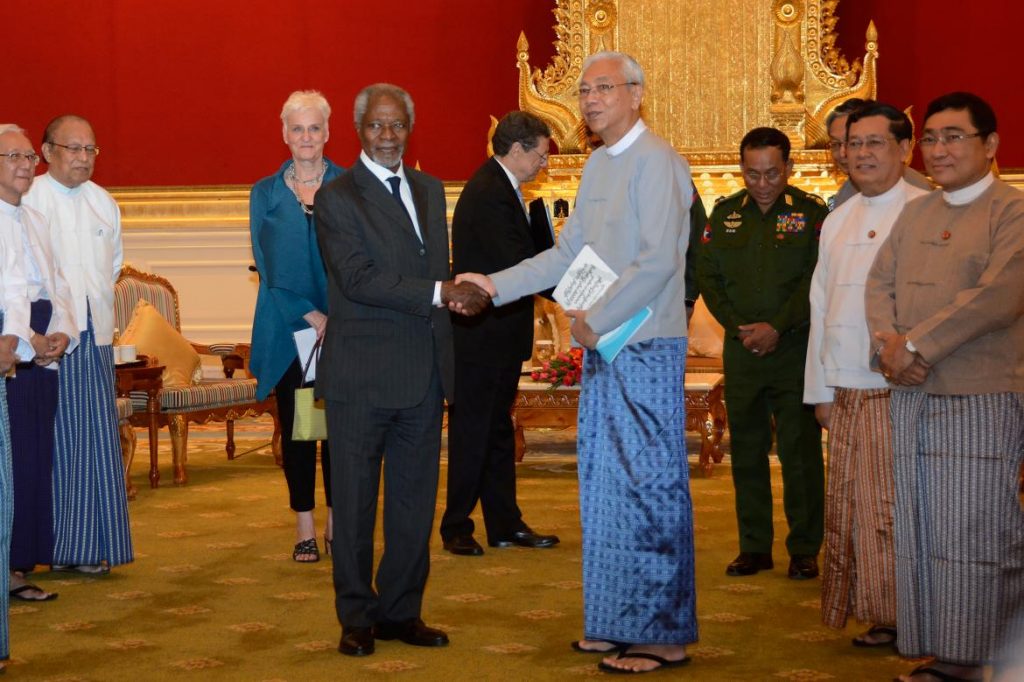By OLIVER SLOW | FRONTIER
YANGON — An advisory commission tasked with finding sustainable solutions in Rakhine State has submitted its final report to the government, where it called for freedom of movement for all people in Rakhine and a review of the controversial 1982 Citizenship Law.
The Advisory Commission on Rakhine State, chaired by former UN Secretary General Kofi Annan, was formed by State Counsellor Daw Aung San Suu Kyi in September 2016. The following month, insurgent attacks on police posts in northern Rakhine State prompted a months-long military crackdown and allegations of grave human rights violations.
An estimated 1.1 million Muslims – many who identify as Rohingya, a term the government rejects – are denied access to citizenship in line with the citizenship law, which was enacted by former dictator U Ne Win. The law does not recognise the Rohingya as one of the country’s 135 recognised ethnic groups.
“The establishment of the Advisory Commission … was a frank recognition that the situation in Rakhine has become untenable, and that fresh ideas and new approaches are urgently needed to end the recurring cycles of violence, poverty and radicalisation,” Annan said at a Yangon press conference Wednesday.
Support more independent journalism like this. Sign up to be a Frontier member.
“We are well aware that our recommendations on citizenship and freedom of movment touch on profound concerns of the Rakhine population,” he added. “Nevertheless, the coommission has chosen to squarely face these sensitive issuses because we believe that if they are left to fester, the future of Rakhine State – and indeed Myanmar as a whole – will be irretriveably jeopardised.”
The commission’s report, released on Thursday, urged the government to bring the law in line with international standards and abolish “different distinctions between different types of citizens”. The law currently recognises full citizens, associate citizens and naturalised citizens.
The report also urged the commission to begin a process to review the citizenship law “to ensure the equitable treatment of all citizens”.
Many of the Rohingya in the state face severe restrictions on movements, and while the commission acknowledged recent efforts by the government to improve freedom of movement in the north of the state, it said it had only effected those holding the correct identification.
“To have greater impact, freedom of movement should be delinked from the citizenship verification process, meaning that all individuals in Rakhine State should be able to move freely irrespective of whether they hold an NVC [National Verification Card], NRC card [National Registration Card] or citizenship documentation, consistent with the basic right of all people to free movement,” the report said.
An estimated 120,000 Muslims are confined to IDP camps in Rakhine, many without access to basic livelihoods such as education, healthcare and livelihoods. The report said that efforts to allow the return of people home has “shown little progress”, and called on the government to develop a “comprehensive strategy towards closing all IDP camps” in the state.
It said the process should be developed through consultation with affected communities and should have clear timelines, adding that all returns and relocations must be voluntary and should allow people to return to their place of origin as a priority.
In the interim, it suggested improving shelter, water, sanitation and livelihoods in the IDP camps.
The report’s recommendations won immediate praise from human rights groups, who called on the government to abide by its findings on Thursday afternoon.
“The Commission’s straightforward approach to the thorny issues of statelessness, ethnicity and vulnerability to rights abuses is really about making the best of a very bad situation,” said Phil Robertson, the deputy Asia director of Human Rights Watch. “The Myanmar government has promised to faithfully implement the recommendations of the Commission and this will be the key test of that commitment.”
“Myanmar needs to throw its full weight behind the Commission’s recommendations, and especially not blink in dealing with the harder stuff, such as ensuring freedom of movement for all communities, prosecuting officials who use their positions to abuse rights or extort people, and ensuring humanitarian access and facing down Rakhine extremists who try to obstruct those operations and intimidate UN staff,” he added.
In northern Rakhine State, humanitarian and media access has largely been cut off since the October attacks, and the commission urged the government to ensure full and regular access to all parts of the state.
The military has been accused of using disproportionate force in its operations, including allegations of mass rape, extrajudicial killing and torture. The government and military have continuously denied all charges.
In March, the UN Human Rights Council passed a resolution to form an investigation team to probe rights abuses in Myanmar, with a particular focus on Rakhine. However, the Myanmar government has denied visas to its members.
The commission called for an “independent and impartial investigation” into the facts on the ground in order to ensure that those who conducted violations are held accountable.
Additionally, the commission called on the government form a ministry tasked solely with implementing its recommendations. It said the appointment should inintially be a one-year appointment and deliver public quarterly reports.
“The secretariat’s staff should be in permanent consultation with groups in Rakhine State in the implementation of its work,” the commission said.
On Wednesday, Annan presented the report to President U Htin Kyaw in Nay Pyi Taw. State-run Global New Light of Myanmar said Htn Kyaw had said he hoped the international community would “understand the challenges and situation being faced by the government” in dealing with the Rakhine issue.







